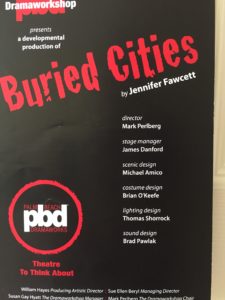 It’s Squib Saturday. Time to share the best, most interesting (or most entertaining, or most outrageous) tidbit of information I’ve gleaned from all the stuff I’ve read –or done. This week: An Interview with Jennifer Fawcett, award-winning playwright, on writing a Novel.
It’s Squib Saturday. Time to share the best, most interesting (or most entertaining, or most outrageous) tidbit of information I’ve gleaned from all the stuff I’ve read –or done. This week: An Interview with Jennifer Fawcett, award-winning playwright, on writing a Novel.
Is it easier to write a play/screenplay or a novel? At different phases of all of my works-in-progress, I have been tempted to abandon the novel format and write them as screenplays. When you’re struggling to describe your protagonist’s inner thought process, or even his/her dress or physical space, you find yourself thinking, well, if this was a play or screenplay, this would be the director’s problem, not mine.
Inner Thoughts
 Then again, some who have spent their careers writing plays envy the novelists’s ability to create a richer universe with insights into a character’s thoughts. As Jennifer Fawcett (pictured), an award-winning playwright who has just completed her first novel, told me: “I wanted to write in a form that allowed me to explore the interior worlds of characters. Of course, the characters in my plays always have these worlds, but plays (like movies) are only communicated through words and actions. I wanted to articulate the thoughts of my characters, and write something that would live only in the imagination the reader instead of being realized in time and space on a stage.”
Then again, some who have spent their careers writing plays envy the novelists’s ability to create a richer universe with insights into a character’s thoughts. As Jennifer Fawcett (pictured), an award-winning playwright who has just completed her first novel, told me: “I wanted to write in a form that allowed me to explore the interior worlds of characters. Of course, the characters in my plays always have these worlds, but plays (like movies) are only communicated through words and actions. I wanted to articulate the thoughts of my characters, and write something that would live only in the imagination the reader instead of being realized in time and space on a stage.”
So, one day, not too long ago, Jennifer, 42, the founder and co-artistic director of Working Group Theatre, Iowa who has had ten of her plays produced on stages around the country, sat down to write her first novel. It’s a psychological thriller, working title, The Octagon House, and is based on a true story from her childhood about the aftermath of finding an abandoned farmhouse reportedly haunted by a woman who killed herself in it. She realized very quickly how different the experience of writing a novel was going to be.
NaNoWriMo Works
“Writing a novel is a very solitary experience,” she said. “Writing a play begins as a solitary experience but then you have to bring in other people; you bring in actors and directors.” She said she was hesitant about telling anyone that she was writing a novel. “I didn’t announce it to the world that I as going to write a novel; I didn’t announce it on FaceBook. I edged my way in. I did NaNoWriMo .”
 For those unfamiliar with NaNoWriMo (National Novel Writing Month) it’s a world-wide online novel writing project in which writers commit to writing 50,000 words of their first draft in the one month of November. The website provides tips and information about other participants in the locality, and an online support community. The idea is to get 50,000 words written — and then to start the process of editing and revising.
For those unfamiliar with NaNoWriMo (National Novel Writing Month) it’s a world-wide online novel writing project in which writers commit to writing 50,000 words of their first draft in the one month of November. The website provides tips and information about other participants in the locality, and an online support community. The idea is to get 50,000 words written — and then to start the process of editing and revising.
Novel Logistics
Jennifer (pictured above at Lake Kivu, Western Rwanda with the International Theatre and Literacy Project in 2013) said: ” My first draft was 60 thousand words, and I had to figure out the logistics of handling all those words. I’m used to dealing with 100 pages, with scenes, and not very many characters. Now, I had 300 pages, and more characters, and my main problem was how to organize all that material in my head so I could come in and out of it, and work with it.”
She added that, with the novel she needed to go over the material “see what’s there, and then see a structure. Only then do I start outlining to get a handle on it. Outlining is not the first thing I do, but it becomes an important tool to get through the work. With a play, I can hold it in my head.”
What other tools helped the most in editing and revising? “I’m a big fan of index cards and color coding on the wall, ” she said. “The process is very revealing. So, for example, if a blue star stands for a particular character and I pin my index cards on the wall, and there’s a big gap where there’s no blue star, then I have to fix that.”
The Dramaworkshop
 Color coding and index cards, however, may not be as useful as the feedback a playwright gets. “I like listening to actors and the director in developmental workshops because when they are creating their roles, there is a lot they have to create themselves. A script is a blueprint, it’s not the finished thing.”
Color coding and index cards, however, may not be as useful as the feedback a playwright gets. “I like listening to actors and the director in developmental workshops because when they are creating their roles, there is a lot they have to create themselves. A script is a blueprint, it’s not the finished thing.”
Two seasons ago, Jennifer’s play, Buried Cities, became the first work chosen for the Palm Beach Dramaworkshop, a developmental lab for new plays. William Hayes, its artistic director, and the brains behind the workshop has said that he believes he has a responsibility to “develop new work because there are fewer opportunities for playwrights’ voices to be heard.”
When Jennifer arrived at the first workshop in April 2015, her play was only half-finished. After 12 days of intense readings, discussions, and revisions (“actors ask very specific questions”), Jennifer had the opportunity to see the play –about the different reactions of a couple who suffer a home invasion while expecting their first child — fully staged in front of an audience of twenty-five. The central issue of the play revolves around the pregnant wife’s decision to buy a gun for protection and her discovery of her husband’s total abhorrence of guns — a conflict which tests the bonds of their marriage.
Audience Comments
The following April, The Dramaworkshop staged the play again for a bigger audience (pictured) — which is how I became acquainted with the play and Jennifer. The audience then had the opportunity to ask questions (“would the pregnant wife really drink Scotch in the scene with her nephew?) and make comments which were forwarded to Jennifer.

 “With Buried Cities, people get caught up in the conversation about the gun, and masculinity and guns. In the play, the husband’s response to being held up is NOT to get a gun,” she explained. “That seemed to trigger lots of response from men, some of whom could not understand the husband’s position. That was fine with me; that was kind of the point of the play. That, to me, doesn’t say that’s a problem with the play. My hope at the end of a play is that audience will say ‘now I understand why someone might NOT want a gun.” As for audience comments? “It was nerve-wracking,” she said, “but it’s part of the process.”
“With Buried Cities, people get caught up in the conversation about the gun, and masculinity and guns. In the play, the husband’s response to being held up is NOT to get a gun,” she explained. “That seemed to trigger lots of response from men, some of whom could not understand the husband’s position. That was fine with me; that was kind of the point of the play. That, to me, doesn’t say that’s a problem with the play. My hope at the end of a play is that audience will say ‘now I understand why someone might NOT want a gun.” As for audience comments? “It was nerve-wracking,” she said, “but it’s part of the process.”
Jennifer has written a new play, Apples in Winter. It was the winner of the 2015 NNPN Smith Prize for Political Theatre, and will premiere in 2018 at Riverside Theatre, Iowa City. Meanwhile, playwrights who are interested in submitting their unpublished work to The Dramaworkshop may read more about the process here.
Photo Credits: Bigstock.com; and (bottom two photos) palmbeachdramaworks.org
After my first read of my Saturday with Joanna my razor edge mind came up with “LESS IS MORE”
AND OF COURSE I WOULD BE DIRECTED TO MAKE MY EXIT!
Thank you for being such a faithful reader, Don